|
|
|
Sort Order |
|
|
|
Items / Page
|
|
|
|
|
|
|
| Srl | Item |
| 1 |
ID:
130063
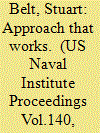

|
|
|
|
|
| Publication |
2014.
|
| Summary/Abstract |
When it comes to solving problems with China's overreach at sea, there are laws for that.
|
|
|
|
|
|
|
|
|
|
|
|
|
|
|
|
| 2 |
ID:
106563
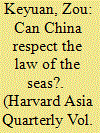

|
|
|
| 3 |
ID:
128281
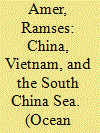

|
|
|
|
|
| Publication |
2014.
|
| Summary/Abstract |
This article examines recent developments in the South China Sea; in particular, the China-Vietnam relationship. The developments are presented in the broader context of the Sino-Vietnamese approach to managing border disputes since full normalization of relations in late 1991. The challenges for China and Vietnam in managing their disputes and related tension in the South China Sea are also discussed.
|
|
|
|
|
|
|
|
|
|
|
|
|
|
|
|
| 4 |
ID:
133093
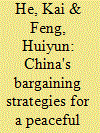

|
|
|
|
|
| Publication |
2014.
|
| Summary/Abstract |
Applying bargaining theory of international conflicts, we examine the successes and challenges of China's strategic choices in its ascent after the Cold War. We suggest that China needs to alleviate information and commitment problems in order to rise peacefully. Since 2008, China's "peaceful rise" strategy has faced serious challenges because of its "assertive turn" in diplomacy. We argue that China has not alleviated or settled these two problems successfully because of its ambiguous "core interest" diplomacy and undecided attitude regarding multilateral institutions in resolving the maritime disputes. China should engage in rule-based, institution building, such as a security community between China and ASEAN, to reinforce its peaceful rise commitments.
|
|
|
|
|
|
|
|
|
|
|
|
|
|
|
|
| 5 |
ID:
128280
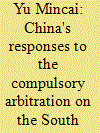

|
|
|
|
|
| Publication |
2014.
|
| Summary/Abstract |
China's responses of turning its back on the compulsory arbitration initiated by the Philippines on 22 January 2013 with respect to aspects of the South China Sea dispute between them under Article 287 and Annex VII of the United Nations Convention on the Law of the Sea and failing to participate in constituting the five-member Arbitral Tribunal raise issues of whether the arbitral process has or can be halted by China and whether China's nonparticipation is in its best interest. This article examines the legal effects of China's actions and China's policy options with respect to the arbitral procedure started by the Philippines.
|
|
|
|
|
|
|
|
|
|
|
|
|
|
|
|
| 6 |
ID:
126620


|
|
|
|
|
| Publication |
2013.
|
| Summary/Abstract |
Maritime territorial disputes have become a hot issue in regional security and a pressing issue for Taiwan's national security. While Taiwan is persistently claiming sovereign right over the large part of the South China Sea based on the U-shaped line, its role is however weakened as a result of the cross-strait hostility and its prolonged hands-off policy. Of course, its ambiguous international status, difficult relation with mainland China and domestic political confusion on nation's future have more to do with its inactive role in the South China Sea disputes. This insecurity contributes to its ambivalent policy. This articleintends to address Taiwan's legitimate claim for the part of the South China Sea, which has been unknown and neglected by the international community, and examine the reasons why Taiwan had taken inactive policy toward the South China Sea. Alerted by recent aggressive moves of other claimants, Taiwan is now shifting to a reasonable tougher strategy in the South China Sea. The articlealso projects the course of fresh efforts made by the Taiwan government pressurised by the public with increasing awareness of urgency.
|
|
|
|
|
|
|
|
|
|
|
|
|
|
|
|
| 7 |
ID:
133778
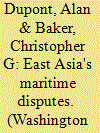

|
|
|
|
|
| Publication |
2014.
|
| Summary/Abstract |
Few doubt that China's rise is this era's principal driver of strategic change, just as the United States' equally influential ascendancy shaped the last. But earlier optimism that the Middle Kingdom's re-emergence as a major power would be largely benign is fading as evidence mounts that Beijing is determined to press its territorial and resource claims in the vitally important seas of the Western Pacific. In barely the blink of a geopolitical eye, China's once lauded charm offensive has given way to exactly the kind of coercive behavior its critics have long predicted.1 In a 3,000-mile maritime arc running from the East China Sea to the southern reaches of the South China Sea, Beijing is at loggerheads with many of its neighbors, including erstwhile friends, over several linked territorial and resource disputes. If not wisely managed, these disputes could bring East Asia's long peace to a premature and bloody end.
|
|
|
|
|
|
|
|
|
|
|
|
|
|
|
|
| 8 |
ID:
132027
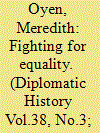

|
|
|
|
|
| Publication |
2014.
|
| Summary/Abstract |
An early battle in the war to gain greater equality for China on the international stage emerged in an unexpected place: Aboard ships around the world sailing for the Allied Merchant Marine. During the Second World War, at least twenty thousand Chinese seamen worked on mostly British ships. Chinese worked long hours, received lower wages than white sailors engaged in the same work, were never given the war risk bonus offered to keep other members of the crew on duty during periods of high risk, and were routinely denied shore leave at U.S. ports on the grounds that they posed a flight risk. In response, Chinese seamen deserted in uniquely high rates, en masse instead of one individual at a time. The nature and scope of the desertions threatened the success of the supply operation, leading the governments involved to come together to try to prevent them.This article explores the multilateral negotiations that endured as long as the war itself. These centered upon three of the most basic inequalities endured by Chinese sailors-unequal pay, lack of war risk bonuses, and lack of shore leave. Using government records from all three parties (the United States, Great Britain, and the Republic of China) as well as press and collections from private organizations, I demonstrate the ways in which racial inequalities ingrained in the international system hindered advances for the Chinese seamen, challenged the smooth management of both Anglo-Chinese and Chinese-American relations, and sparked conflict between the Nationalist Chinese government and the seamen themselves. The legacies of British colonialism in Asia and American exclusion of Chinese combined with wartime public opinion to push forward changes when international union efforts failed.
|
|
|
|
|
|
|
|
|
|
|
|
|
|
|
|
| 9 |
ID:
131328


|
|
|
|
|
| Publication |
2014.
|
| Summary/Abstract |
Piracy in international waters is on the rise again, in particular off the coast of Somalia. While the dynamic game between pirates, ship-owners, insurance firms and the military seems to have reached some kind of equilibrium, piracy risks generating significant negative externalities to third parties (e.g. in terms of environmental hazards and terrorism), justifying attempts to contain it. We argue that these attempts may benefit from a look back - through the analytical lens of rational choice theory - to the most successful counterpiracy campaign ever undertaken, namely, the one led by the Roman general Gnaeus Pompeius Magnus (Pompey the Great) in 67 BC.
|
|
|
|
|
|
|
|
|
|
|
|
|
|
|
|
| 10 |
ID:
133062
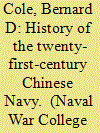

|
|
|
|
|
| Publication |
2014.
|
| Summary/Abstract |
China historically has been a continental rather than a maritime power, despite its more than eleven thousand miles of coastline and more than six thousand islands. It has more often viewed the sea as a potential invasion route for foreign aggressors rather than as a medium for achieving national goals, a tendency that has contributed to the weakness of the Chinese maritime tradition. This attitude had changed by the beginning of the twenty-first century. The remarkable growth of China's economy beginning in the last two decades of the twentieth century, the broadening of Beijing's global political and economic interests, and resolution of almost all border disputes with its many contiguous neighbors have contributed to increased attention to threats to the vital sea lines of communication (SLO Cs) on which China increasingly depends.
|
|
|
|
|
|
|
|
|
|
|
|
|
|
|
|
| 11 |
ID:
132026


|
|
|
|
|
| Publication |
2014.
|
| Summary/Abstract |
This article argues that in ignoring the exploits of American sailors overseas, diplomatic historians have missed a very important facet of the early republic's foreign relations. It claims that 1898 did not represent any decisive turn to the international, but rather, a moment in which primary control over the nation's foreign relations shifted from maritime nonstate actors to the state itself. To make this case, the essay discusses the form and substance of violent altercations between American seafarers and those they encountered abroad. It reads barroom brawling and harborside tumult as "diplomatic fisticuffs," that is, as sites for the enactment of a distinct, working-class and masculine foreign relations agenda. Politicians, diplomats, and missionaries, however, saw the mighty influence seafaring men exerted overseas as deeply problematic. But even as the American state worked to control rambunctious sailors, late nineteenth-century policy makers discovered that appropriating the violent words and deeds of the nation's nautical class could prove useful in justifying imperial adventure abroad. Thus even as the nation's mariners receded from view overseas, they continued to influence events around the globe.
|
|
|
|
|
|
|
|
|
|
|
|
|
|
|
|
| 12 |
ID:
139188


|
|
|
|
|
| Summary/Abstract |
The India Ocean Region (IOR), while being a major source for energy security and trade, is also a cauldron of instability due to conflicts, piracy and terrorism. The major power consider the IOR to be of great strategic significance. China too, is steadily enhancing its footprint in the IOR. India’s geographical location gives it a natural influential position over the major sea lines of communication and choke points in the Indian Ocean. Its aerospace capabilities are vital elements of national power for securing interests in the region. Hence, these capabilities need to be developed and acquired to match the imperatives of the time.
|
|
|
|
|
|
|
|
|
|
|
|
|
|
|
|
| 13 |
ID:
130882
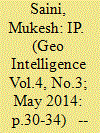

|
|
|
|
|
| Publication |
2014.
|
| Summary/Abstract |
Cyber warfare is very similar in nature to naval warfare. In international waters, navy encounters enemy warships, large merchant vessels, small merchant ships, fishing boats and guised surveillance ships from all directions. There are no borders to clearly establish that everything on the other side belongs to enemy. Though there are Sea-Lanes-of-Communication (SLOC) but two ports are actually on connectionless service and no ship is bound to follow SLOC. In cyberspace, IP address is the flag which every asset on the Internet displays but ruse is not uncommon. It is therefore necessary to identify the cyber assets positively in any cyber-conflict before any aggressive response is initiated. Wearing flag of convenience is common for sea vessels as well as cyber assets.
|
|
|
|
|
|
|
|
|
|
|
|
|
|
|
|
| 14 |
ID:
094106
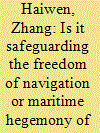

|
|
|
|
|
| Publication |
2010.
|
| Summary/Abstract |
In recent years, maritime conflicts between China and the United States have occurred successively in the sea areas around China. Legally, these conflicts were caused by the different interpretation and application between the two countries of the LOS Convention or the customary international law rules reflected in the Convention, including mainly, firstly, jurisdiction over military activities, such as military surveys in the EEZ; and secondly, marine scientific research and classification of activities of marine data collection. China's practices conform with the Convention and the contemporary international practice. However, as a non-State-party to the Convention, the United States has taken advantage of the parts of the Convention that are in its own interests and is trying to escape from the relevant international legal obligations.
|
|
|
|
|
|
|
|
|
|
|
|
|
|
|
|
| 15 |
ID:
130066
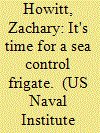

|
|
|
|
|
| Publication |
2014.
|
| Summary/Abstract |
A vessel based on the national security cutter could offer significant benefits to the Navy.
W hile O liver Hazard Perry- class frigates are not the only platforms you would want for a serious confrontation, they are great independent-deployers and effective at a multitude of missions such as escort operations and antisubmarine warfare (ASW). As the Navy decommissions the last 15 frigates, soon to be joined by 21 Ticonderoga- class cruisers, we will call on our existing hulls to support their ongoing missions. There is little doubt the littoral combat ship (LCS) fills some of this void, but even the top brass seem to agree that it's ineffective in a high-endurance, blue-water setting.
In January, a report from the Pentagon described a plan to cut the amount of LCSs from 52 to 32 ships, and in a leaked classified memo, Commander of Naval Surface Forces Vice Admiral Tom Copeman called for a new type of multi-mission ship. 1 Many envision a new combatant ship that incorporates air- and missile- defense radar and an electromagnetic railgun. While it is imperative that the Navy build these types of ships, a multibillion-dollar warship juggernaut is simply unnecessary when a new, cost-effective frigate could effectively accomplish the same missions.
Of the many potential frigate designs, Huntington Ingalls Industries offers one derived from its successful national security cutter (NSC) hull dubbed the "patrol frigate," originally intended and modeled for international navies. At first, it may seem preposterous to paint a Coast Guard cutter gray and call it a warship. In the July 2013 issue of Proceedings , Norman Polar opined that more frigates were needed, but was quick to dismiss a patrol frigate as a viable option. He claimed it "lacked growth potential and service life, as well as certain military features." 2 But tweaking the NSC could turn it into a viable candidate that meets the Navy's needs.
|
|
|
|
|
|
|
|
|
|
|
|
|
|
|
|
| 16 |
ID:
133391
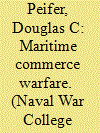

|
|
|
|
|
| Publication |
2013.
|
| Summary/Abstract |
Maritime commerce warfare" has a distinctly dated whiff. The great Anglo- American naval theorists of the late nineteenth and early twentieth centuries-the Colomb brothers, Alfred Thayer Mahan, and Julian Corbett-all dismissed it as an indecisive strategy of the weak. Imperial Germany's turn to unrestricted submarine warfare in 1917 failed to achieve its political purpose, instead bringing the United States into the war just as war weariness and revolution threatened to undermine the Entente's military effectiveness. In the Second World War, both Germany and the United States used the submarine with deadly effectiveness against the maritime supply lines of their enemies, but even the more effective of their campaigns-that of the U
|
|
|
|
|
|
|
|
|
|
|
|
|
|
|
|
| 17 |
ID:
129230


|
|
|
|
|
| Publication |
2014.
|
| Summary/Abstract |
H ARGEISA, Somalia - Mowlid Ahmed Abidoon stands quietly in the small prison cell where he has lived for nearly two years. Slot windows on one wall let in only a little sunlight, leaving his face almost entirely obscured in darkness. Yet there are splashes of color all around: The room's bunk beds are covered in sheets with bright floral and geometric patterns, over which hang canopies of blue mosquito nets -- cells within the cell. Clad in a striped polo shirt and prison-uniform pants, Mowlid estimates that he is about 20 years old; the last traces of baby fat still cling to his cheeks. He insists that he shouldn't be behind bars. "I'm a fisherman, not a pirate," he says flatly, as though he has delivered this speech a hundred times before. Court documents from Seychelles say otherwise. On Dec. 6, 2009, Mowlid and a band of fellow Somali pirates used firearms and explosives to attack the Topaz, a Seychelles Coast Guard patrol vessel. (Seychelles, an island nation, is about 825 miles southeast of Mogadishu, Somalia's coastal capital.) They were arrested, convicted, and sentenced to 24 years in prison.
|
|
|
|
|
|
|
|
|
|
|
|
|
|
|
|
| 18 |
ID:
130753
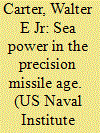

|
|
|
|
|
| Publication |
2014.
|
| Summary/Abstract |
In the hands of adversaries, long-range strike systems could drastically alter the conduct of war at sea.
The constant evolution of military technology has driven continuous change in the character of warfare, to the benefit of the militaries that adapt the most successfully. More than 70 years have passed since a major maritime conflict. During that time many new technologies have emerged, with few combat tests to provide reliable guideposts regarding what will prove successful now and in a future conflict.
|
|
|
|
|
|
|
|
|
|
|
|
|
|
|
|
| 19 |
ID:
128286
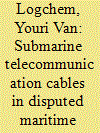

|
|
|
|
|
| Publication |
2014.
|
| Summary/Abstract |
There are a considerable number of maritime areas where no boundary exists, or where a boundary is delimited only in part. This article deals with the issue of submarine telecommunication cables, which are sometimes placed on the seabed or buried in the subsoil of areas that are claimed by multiple states, and identifies specific issues that arise in the context of areas of overlapping claims.
|
|
|
|
|
|
|
|
|
|
|
|
|
|
|
|
| 20 |
ID:
131657
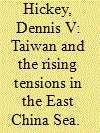

|
|
|
|
|
| Publication |
2014.
|
| Summary/Abstract |
This study examines Taiwan's policy toward the territorial dispute in the East China Sea and explains why it has yielded some dividends. The paper suggests that Taipei's diplomatic initiative-the East China Sea Peace Initiative-is the most sensible proposal advanced to reduce the potential for conflict in the region.
|
|
|
|
|
|
|
|
|
|
|
|
|
|
|
|
|
|
|
|
|